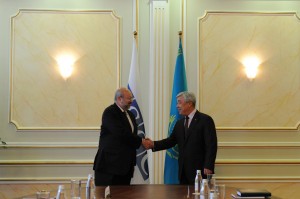 ASTANA – The need for an undivided European and Eurasian security community and the role of the Organisation for Security and Cooperation in Europe (OSCE) in building it were the main topics of the April 28 meeting between Kazakh Foreign Minister Erlan Idrissov and Secretary General of the OSCE Lamberto Zannier in Astana.
ASTANA – The need for an undivided European and Eurasian security community and the role of the Organisation for Security and Cooperation in Europe (OSCE) in building it were the main topics of the April 28 meeting between Kazakh Foreign Minister Erlan Idrissov and Secretary General of the OSCE Lamberto Zannier in Astana.
The two also discussed a wide range of issues in developing bilateral cooperation between Kazakhstan and the OSCE, including current international issues and prospects for cooperation in various joint projects. They assessed the situation in and around Ukraine and the role of the OSCE in international efforts to defuse tensions.
The overriding message from the meeting was that the OSCE is an organisation uniquely positioned to comprehensively address the range of security issues in its area of responsibility and that the OSCE summit in Astana in December 2010 gave a clear direction for its future development. It was also stressed that the OSCE can play a larger role in international efforts to prevent the situation in Ukraine from escalating further and that the key idea of the Astana Declaration of 2010, of the need to build an undivided security community in both Europe and Eurasia, was made more relevant in light of the Ukrainian crisis.
“Both sides confirmed that the joint promotion of the legacy of the OSCE Astana Summit is an important direction of work, which will be the main priority of Kazakhstan in its activities within the organisation in the coming years. As a stable and reliable partner in promoting peace and cooperation, Kazakhstan announced its candidacy for non-permanent membership in the UN Security Council for 2017-2018, including the intention to achieve the creation of a Euro-Atlantic and Eurasian security community – the strategic goal set forth in the Astana Declaration,” the Kazakh foreign ministry’s press service reported.
Zannier stressed that the priority of the OSCE’s work is to ensure comprehensive security from Vancouver to Vladivostok, a reference to the vast expanse of land from North America across Europe to easternmost Russia that encompasses the 57 participating states of the organisation. According to Zannier, in light of today’s realities, security issues cannot be viewed as exclusively regional and require the involvement of new members.
Idrissov and Zannier also discussed the development of the political situation in Ukraine. “We stand for the peaceful resolution of the crisis in Ukraine and overcoming it through the negotiation process under the auspices of the UN and other international organisations,” Idrissov said. Against this backdrop, Zannier noted, there is a growing need to continue building a common space and indivisible security community that covers Europe and Eurasia.
Idrissov and Zannier discussed security issues and transnational threats as one of the most crucial fields of cooperation. In particular, the parties discussed the potential challenges and threats coming from Afghanistan.
“We believe the OSCE, having much experience, jointly with the UN and other international organisations, could contribute to strengthening the effectiveness of the border services of Central Asian countries and participate in the implementation of programmes to support efforts in combating drugs in Afghanistan and neighbouring countries,”Idrissov said at the meeting, according to a Ministry of Foreign Affairs press release.
The sides also discussed inter-religious and interethnic tolerance in the context of the slow recovery of the world economy out of recession and the impact of adverse economic factors on the growth of intolerance and discrimination. The sides expressed concern over increased hostile speech and hate crimes, xenophobia and Islamophobia in the OSCE region, including the on the Internet.
Another important item on the agenda was the functioning of the OSCE in Kazakhstan. Idrissov spoke about the need for consistent and systematic work on re-assessing the status of the organisation.
“Kazakhstan has made significant progress in economic development, the country has created mature political and civil institutions, has experience in all three dimensions of security. We believe it is time to adjust the interaction between Kazakhstan and the OSCE to new realities and new collaborative arrangements. The year 2015, the anniversary year for the OSCE, will give us a good reason to evaluate our membership in the organisation within the Helsinki+ 40 process. But even now I can already say that for Kazakhstan, it was an impressive and valuable experience of cooperation in making an active contribution to the strengthening of peace and stability in the OSCE area,” the Kazakh foreign minister noted.
“We want to update the method of our work with Kazakhstan. We want to modernise our work here. We consider the Kazakhstan 2050 Strategy as an important set of priorities. We will encourage the role of Kazakhstan in the region, as well as the OSCE’s role here,” Zannier said at a media briefing after the meeting.

